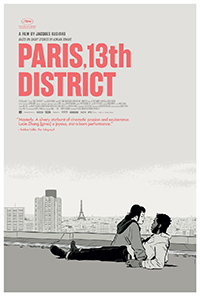Same Old Song & Angst: Audiard Misfires with Millennial Love Tugs
 Jacques Audiard turns to youth culture amour fou with his latest feature, Paris, 13th District (aka Les Olympiades), based on three novels by American cartoonist Adrian Tomine. The English language title’s reference to the 13th arrondissement in Paris might confuse seeing as the displaced source material provides little insight to this particular locale other than its diverse populace.
Jacques Audiard turns to youth culture amour fou with his latest feature, Paris, 13th District (aka Les Olympiades), based on three novels by American cartoonist Adrian Tomine. The English language title’s reference to the 13th arrondissement in Paris might confuse seeing as the displaced source material provides little insight to this particular locale other than its diverse populace.
Although beautifully shot in black and white by Paul Guilhaume (who lensed Ava for Lea Mysius in 2017), which feels more a throwback to Nouvelle Vague tactics more than anything else, and featuring an ambient score from Rone, this surprisingly tone deaf disappointment from Audiard was also adapted by two of France’s most lauded contemporary directors, Celina Sciamma and Mysius. Formidably inauthentic from its opening frames, the film professes to be about ‘modern love’ but plays like a throwback to Gen X romantic dramas from the 1990s, where such blunt depictions of sexuality and multiple sex partners still retained shock value.
Emilie (Lucie Zhang) lives rent free in her grandmother’s flat, but needs to let the other room for supplemental income. When Camille (Makita Samba) arrives to take a look, she’s initially dissuaded as she prefers a female roommate. However, they share an instant sexual attraction, which leads to Camille moving in with two weeks of romantic bliss for Emilie, who has fallen head over heels. But Camille isn’t interested in a relationship and brings other women over to the apartment, sparking their swift dissolution as friends or lovers. Enter another new denizen to their neighborhood, Nora (Noemie Merlant), who has left behind her uncle’s real estate agency to return to school as a thirtysomethibng and get her law degree. A bizarre snafu finds her younger classmates mistaking her for a sex worker named Amber Sweet (Jhenny Beth). The fall out results in her leaving school to apply a sales agent in the office now manned by Camille, who has agreed to run the agency for his friend after leaving behind teaching to pursue his doctorate. They share a stilted curiosity for one another, which sends Nora headlong into virtual pursuit of Amber Sweet. This rift finds Camille returning to court Emilie.
Decades from now, Paris, 13th District is going to feel a lot like Bodies, Rest & Motion (1993) does today, an inaccurate account of a particular period in time about fluctuating attitudes regarding relationships and sex. Like the titillating version of Nanni Moretti’s Three Floors, these vaguely connected characters defined solely by propinquity, are as interchangeable as their actions suggest. Jerry Bruckheimer’s confounding Twelve (2010) also comes to mind, another work from a director who doesn’t the wisest choice for a tale about young adults navigating an increasingly volatile world.
Elements of Sciamma seem apparent, if mostly for the Noemie Merlant (The Portrait of a Lady on Fire, 2019) connection and storyline, but it’s here where the film also falters significantly. Characterized as “frigid” in the wake of a significantly adolescent school drama involving her similarity to an apparently notable online sex worker, she’s able to discover her passion through a poorly conceived rapport with Beth’s Amber Sweet.
Even sans the ridiculous impetus for withdrawing from law school (which features an unnecessary moment of brute force as concerns her only identified bully), the lesbian coupledom feels more appropriate for Hitchcockian doubling as Nora is ultimately only awakened/attracted to her own image. Defined by a past sexual trauma involving her uncle, the storyline features too many undeveloped facets to be either believable or enjoyable. While Makita Samba creates a compelling screen presence, the character of Camille unfortunately ends up being the most shallow of the quartet, and one wonders if this wouldn’t have been a more interesting film project if the three directors writing the script hadn’t settled on one storyline instead of peddling an interconnected diaspora with diminishing returns.
More appropriately termed is the incestuous romanticism of Emilie and Camille, and to its credit, Audiard seems to focus on them, an appropriate element considering the large community of Asian immigrants in this particular arrondissement. Unfortunately, Sandra is immature to the point of neuroses, and her forced connection with Samba’s Camille, while inevitable according the film’s rhythms, never rings true.
While opening on a striking moment of sing-songs commiseration, and some striking visuals during an MDMA trip, Audiard has delivered a quartet of cliched characters who may experience growth but aren’t ever presented with a poignant epiphany about themselves or what’s driving their relationships towards others. Hiding beneath the veneer of stylized flourishes, it’s a film of dark mirrors, reflecting cannibialized ideas and motifs which reflects an amorphous void.
Reviewed on July 14th at the 2021 Cannes Film Festival – Main Competition. 105 Mins
★/☆☆☆☆☆


